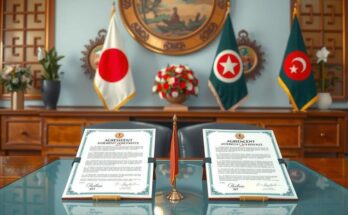Israel and Lebanon are close to a ceasefire deal to end fighting with Hezbollah. The agreement consists of a proposed 60-day truce, troop withdrawals, and increased Lebanese Army presence. Despite escalated violence impacting both nations, discussions are ongoing, with concerns over enforcement and domestic opposition in Israel remaining a focal point.
Recent developments indicate that Israel and Lebanon are nearing an agreement for a ceasefire, with discussions facilitated by Israeli officials and an imminent meeting of the Israeli cabinet. The proposed ceasefire, lasting 60 days, aims to conclude hostilities between Israel and Hezbollah, the Iranian-aligned Lebanese militia. Key elements of this arrangement include the withdrawal of Israeli military forces from southern Lebanon and a commitment from Hezbollah to cease its activities in the region.
Despite ongoing tensions and an escalation of violence—including around 250 projectiles launched from Lebanon into Israel over the weekend—the two parties continue to negotiate the details of the ceasefire. The Israeli Air Force has persisted in targeting suspected Hezbollah positions. A Western diplomat indicated that the ceasefire arrangement could also involve a greater deployment of the Lebanese Army in territories vacated by both Hezbollah and Israeli forces.
Elias Bou Saab, the Lebanese Deputy Parliament Speaker, stated that there are currently no significant obstacles to reaching a ceasefire agreement. The prior contention regarding the monitoring of the ceasefire has reportedly been resolved by establishing a five-country committee headed by the United States, which includes France.
Another point of contention has been Israel’s demand for the right to conduct military operations in Lebanon if it detects signs of Hezbollah regrouping. This request has been met with resistance from both Hezbollah and the Lebanese government. Notably, U.S. envoy Amos Hochstein has emphasized the urgency of finalizing this ceasefire deal. While concerns regarding the enforcement of the ceasefire have been largely addressed, domestic opposition in Israel complicates matters further, particularly from officials like National Security Minister Itamar Ben Gvir, who views a ceasefire as a strategic error given current military advantages over Hezbollah.
The Lebanese government and various officials claim that any ceasefire must adhere strictly to the terms of United Nations Security Council Resolution 1701, which called for the disarmament of Hezbollah and the withdrawal of Israeli forces following the 2006 war. Since the recent outbreak of hostilities in late September, casualty figures in Lebanon have risen significantly, complicating an already precarious humanitarian situation.
The conflict between Israel and Hezbollah has deep historical roots, particularly following notable confrontations such as the 2006 Lebanon War, which ended with UN Security Council Resolution 1701. This resolution aimed to maintain peace along the Lebanon-Israel border and addressed the disarmament of Hezbollah, a commitment that has since faced challenges. The recent escalation of violence, which began in late September 2023, has resulted in widespread casualties and displacement in Lebanon, emphasizing the urgent need for a new ceasefire arrangement. The ongoing negotiations reflect the complex interplay of military, political, and humanitarian considerations in the region, demonstrating the fragility of peace amidst sustaining tensions.
In summary, Israel and Lebanon are reportedly close to finalizing a ceasefire agreement to halt the ongoing violence involving Hezbollah. The proposed ceasefire includes key elements such as troop withdrawals and increased Lebanese military presence, although several issues remain contentious. Domestic opposition in Israel poses a significant challenge to the agreement’s acceptance. Overall, this situation highlights the precarious balance of power and the need for sustained diplomatic efforts to secure stability in the region.
Original Source: www.bbc.co.uk




